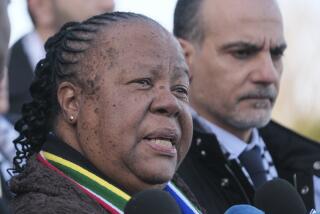S. Africa Tightens Restrictions in Cape Province
- Share via
JOHANNESBURG, South Africa — Emergency restrictions were tightened Friday in a large region of South Africa to prohibit such activities as appeals for the release of political detainees or calls for the legalizing of banned political organizations.
Meanwhile, the British ambassador, on behalf of the 12-nation European Communities, protested this country’s human rights abuses, including forced removals of blacks, detentions without trial and severe limitations on the press.
A sweeping new decree containing the additional restrictions was issued in Cape Town by the police chief of western Cape province, Maj. Gen. Christoffel Swart. It is limited to that region, which is South Africa’s second most populous after the Johannesburg area.
The decree orders that no one may take part “in any manner whatsoever” in specified activities by 12 anti-apartheid organizations, including the United Democratic Front, the main alliance of black activist movements here.
Bans Appeals for Release
The activities include appeals for the release of people detained without charges under the emergency regulations or convicted under the security laws.
They also include calls for the legalizing of the African National Congress and other banned organizations, as well as appeals for the withdrawal of the large number of troops who have effectively occupied the black townships since the emergency declaration last June.
The decree prohibits participation in a “Christmas of Concern” campaign organized by church civil-rights groups. The organizers have appealed to people to pray for detainees, light candles for them on Christmas Eve and collect money and games to be sent to them in prison.
Several special church services for detainees have been arranged, including one in Cape Town’s Anglican cathedral Sunday at which Archbishop Desmond Tutu, the 1984 Nobel peace laureate, is scheduled to preach. The decree appears to prohibit these services.
Third Diplomatic Protest
Swart, who has gained a reputation as South Africa’s toughest police officer during the past two years of racial conflict, issued his decree within hours after British Ambassador Patrick Moberly, on behalf of the European Communities, protested to the Department of Foreign Affairs in Pretoria against what he described as “serious abuses of human rights.”
It was Moberly’s third diplomatic protest to the South African government in just over a month. Early in November, he expressed Britain’s dismay at the forced removal of the black inhabitants of Oukasie township, then repeated the protest on behalf of the community later in the month.
Friday’s protest was against forced removals, detentions and the new press restrictions.
“Taken together,” Moberly said in a statement afterward, “these various infringements and abuses of human rights bring into question the South African government’s claim to be committed to Western values.”
‘Draconian’ Restrictions
Moberly said he expressed the concern of the 12 European governments that forced removals are continuing despite Pretoria’s assurances that they had been stopped. He said he stressed particularly the European Communities’ concern at the large number of young people, including children, who have been detained.
Moberly’s statement added that the “Draconian” new press restrictions are “counter to the principles of democracy and free speech.”
Meanwhile, a series of court actions challenging the legality of the press restrictions are being prepared.
The two major English-language newspaper companies, Argus and South African Associated Newspapers, and the liberal opposition Progressive Federal Party announced Friday that they intend to challenge the censorship proclamation in court. The United Democratic Front announced earlier that it intends to do so.
More to Read
Sign up for Essential California
The most important California stories and recommendations in your inbox every morning.
You may occasionally receive promotional content from the Los Angeles Times.













